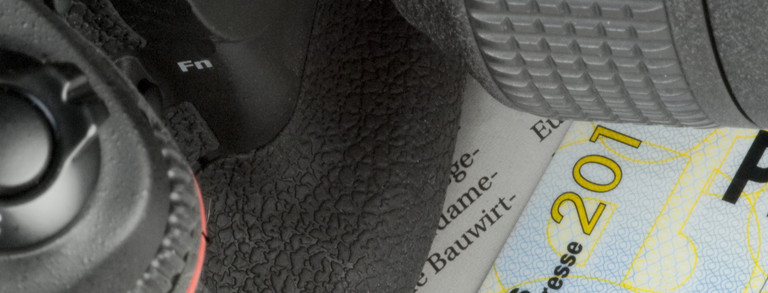Lectures on uncertainty and sustainability bring science to the city
- Research
- Top News
- Campus & Culture
- People
- Press Releases

On October 18, the annual Gambrinus Forum took place at the Westfälischer Industrieklub. For the 26th time, the TU Dortmund invited representatives of the urban society to scientific lectures in the middle of Dortmund's city center. Law professor Gad Barzilai from the University of Haifa, Israel, spoke about how crises can affect politics and society. Philosopher Prof. Michael Quante from the Westphalian Wilhelms University (WWU) Münster gave a lecture on the topic of "The Time of Sustainability".
In his welcoming speech, TU Rector Prof. Manfred Bayer emphasized the importance of the Gambrinus Forum as a liaison between international research and the TU Dortmund with the city and its society. This year's event was again able to stimulate international and regional exchange: Despite different backgrounds and research areas, the two scientists found common ground in their presentations, especially with regard to the topic of crisis and the different motivations and perspectives within a society.
Dealing with uncertainty
Professor Gad Barzilai, law professor at the University of Haifa, Israel, gave a lecture on the influence of crises – such as the coronavirus pandemic, the Russian war of aggression against Ukraine or natural disasters – on society and politics. He concerned himself in depth with the question of how the legal system can change in uncertain times and also emphasized the dangers to democracy, for example through the political extremism burgeoning in the crisis. He outlined how national sovereignty, democratic values shared at international level and social movements can protect democracy. What would also help, he said, would be to prepare for times of uncertainty and to establish regulatory mechanisms in advance for dealing with different crises. Only in this way, he continued, would society and the state be strong enough to react to crises and protect democratic values in an emergency.
Professor Barzilai has also served as Dean of the Faculty of Law (2012-2017) and as Vice Chancellor and Head of the International School (2017-2019) at the University of Haifa. He is an emeritus professor at the University of Washington, USA, and has taught in over twenty countries on various continents.
About the time of sustainability
Professor Michael Quante looked at the topic of sustainability from the perspective of practical philosophy. In his lecture, he presented various dimensions of the sustainability debate, in which time is a justifying, motivating and intricately structuring variable. It is about time pressure, for example, and the demands of different generations, about looking at the past, present and future – but also about the biographical position of individuals in time. Is it people living today who have a prerogative? Or those living in the future? Does the past have some meaning for the questions of justice in the present? By asking these and other questions, philosophers can contribute to changing people’s perspective, to creating understanding and to tackling the issue of sustainability in a circumspect rather than hectic way.
Following appointments at the University of Duisburg-Essen and the University of Cologne, Professor Michael Quante joined the University of Münster in 2009 as professor for practical philosophy, where he is also spokesperson for the Center for Advanced Study in Bioethics, a researcher in the Cluster of Excellence “Religion and Politics” and Vice-Rector for Internationalization, Knowledge Transfer and Sustainability.
The Gambrinus Fellowships at TU Dortmund University
The Gambrinus Fellowships have facilitated research visits by international scholars to TU Dortmund University since 1993. They were introduced by the Verband Dortmunder Bierbrauer (Association of Dortmund Beer Brewers) on the occasion of the 700th anniversary of the brewing rights of the City of Dortmund. In total, Dortmund has already welcomed over 200 visiting scholars, and a large number of international partnerships have been established. The target audience for the annual Gambrinus Forum, with lectures by internationally renowned scholars, is the non-university public, and it has been held at Westfälischer Industrieklub since 2016.
Contact persons for queries:




![[Translate to English:] Partner Four hands are holding the green logo of TU Dortmund University](/storages/tu_website/_processed_/1/d/csm_Partner_Nicole_Rechmann_KW_40b35bb3fd.jpg)




![[Translate to English:] Forschung An apparatus with tubes in a laboratory](/storages/tu_website/_processed_/0/c/csm_Forschung_Juergen_Huhn_cbd34afd6d.jpg)
![[Translate to English:] Studium Five students are sitting in a lecture hall. They are talking to each other.](/storages/tu_website/_processed_/c/9/csm_Studium_FelixSchmale_81d94adc86.jpg)









